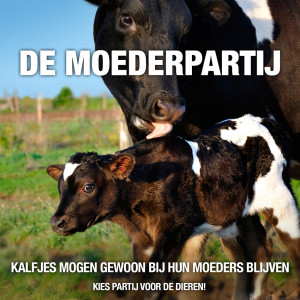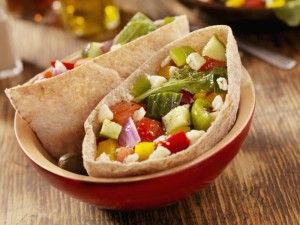Worldlog 15 de febrero 2016
Hoy me gustaría comenzar con una gran noticia. La semana pasada tuvimos un claro avance en el Parlamento. Desde la fundación de nuestro partido hemos luchado por los animales en la industria ganadera. También por los terneros en la industria láctea que son cruelmente separados de sus madres inmediatamente después del nacimiento para ponerlos en un establo solitario. En la naturaleza los terneros permanecen de 6 a 12 meses con su madre.
Las vacas lecheras deben tener un becerro cada año. Así su producción de leche sigue siendo alta. La mayor parte de estos terneros es un “residual”: los toritos no dan leche y no crecen lo suficientemente rápido como para hacer carne. Son sacrificados para carne de ternera después de un máximo de 8 meses.
El Partido para los Animales opina que los becerros tienen derecho de crecer con una madre y una mayoría del Parlamento ahora opina lo mismo! Me alegra que nuestra moción para dejar a los terneros durante un tiempo con su madre fuera aceptada. Hay que respetar los procesos naturales tales como la cría de los pequeños.

El partido madre, los terneros pueden quedarse con la madre. Voten por el Partido para los Animales!
La mayoría del Parlamento está de acuerdo con la decisión del gobierno para que los Países Bajos empiecen con el bombardeo en Siria. Una decisión muy peligrosa. Por eso hemos votado en contra. La organización Pax, la Cruz Roja y Amnistía Internacional han llamado a la prudencia, pero a la mayoría del Parlamento no les importan estas opiniones. El bombardeo no contribuye a un aumento de la seguridad en el mundo, no contribuye a incrementar la seguridad en Siria y no contribuye a un aumento a la seguridad en los Países Bajos.
Por el contrario, la participación en el bombardeo conduce directamente e indirectamente a la puesta en peligro. Esto podría causar represalias terroristas en los Países Bajos y causa una mayor radicalización. ¿Quién quiere alcanzar la paz a la fuerza, logra lo contrario.
El año pasado, 28.000 personas han firmado una petición para unas variantes vegetarianas en los helados populares de Ben & Jerry. Ben & Jerry ha anunciado lo siguiente hoy que los nuevos sabores veganos saldrán en algún momento en febrero del presente año en los Estados Unidos. Muy positivo ver que acciones como estas tienen un efecto positivo.
Una investigación realizada por la Oficina de Planificación Social y Cultural en los Países Bajos muestra los holandeses con cada vez mas frecuencia hacen sus compras con una idea de conciencia. Lo hacen por ejemplo mediante el boicot a determinados productos y que los Países Bajos cuenta con cada vez mas flexitarios. Para mi esos sabores de helados veganos estarán bienvenidos a los Países Bajos!

En Irlanda recientemente dos personas han fallecieron por la gripe porcina. Vea la sección “Zoonosis” de nuestro documental “Un Solo Planeta ‘para aprender más sobre la relación entre la industria ganadera y los riesgos para la salud humana. Haga también conscientes a sus alrededores de estos peligros: Comparten esta animación en las redes sociales. En ‘The Meatrix Relaunched’ se explican en forma muy breve pero clara los problemas que genera la ganadería a gran escala.
Un saludo cordial,
Marianne
I would like to start with some fantastic news. Last week we had a major breakthrough in the Lower House. Ever since the start of our party we have been fighting for animals in the livestock industry. As well as for calves in the dairy industry, which are cruelly separated from their mothers upon birth and are put into so-called individual pens. In nature, calves stay with their mothers for 6 to even 12 months.
Dairy cows have to give birth once a year to continue producing milk. The majority of those calves are a ‘by-product: little bulls do not give milk and do not grow fast enough to turn them into steak. After at most 8 months, they are slaughtered to produce veal meat.
The Party for the Animals believes that calves have the right to grow up with their mothers, and a majority of the Lower House now agrees! I am delighted that our motion to keep calves with their mothers for a certain time has been accepted. We must respect natural processes such as the rearing of young animals.

The mother party, calves are allowed to stay with their mothers. Vote for the Party for the Animals!
The majority of the Lower House agrees with the government’s decision that the Netherlands is to start bombing in Syria. A highly dangerous decision. For that reason we have voted against it. Peace organisation Pax, Red Cross and Amnesty International have called for caution, but the majority of the Lower House just ignored that advice. The bombing will not contribute to increasing the safety in the world, will not contribute to increasing the safety in Syria, and will not contribute to increasing the safety in the Netherlands.
On the contrary, participation in the bombings will lead to direct and indirect risks. It can, for example, lead to retaliation in the Netherlands and contribute to further radicalisation. Anyone who wants to make peace with violence will achieve the opposite.
Last year, 28,000 people signed the petition for vegan-friendly options of the popular Ben&Jerry’s ice cream. Ben&Jerry’s has currently announced that the new vegan-friendly flavours will start to be sold in the United States in February of this year. It is great to see that this type of actions has a positive effect.
Research by the Social and Cultural Planning Bureau in the Netherlands has demonstrated that Dutch people increasingly do shopping in a more conscious manner by boycotting certain products and that the number of flexitarians in the Netherlands is growing. If it was up to me, those vegan ice flavours should also be introduced in the Netherlands!

Two people recently died in Ireland from swine flu. See the chapter ‘Zoonoses’ of our documentary ‘One Single Planet’ to learn more about the relationship between the livestock industry and public health risks. Make your environment aware of these risks too: therefore share this animation film on social media. In ‘The Meatrix Relaunched’ it is briefly, yet clearly, explained what problems the large-scale livestock industry brings us.
Kind regards,
Marianne